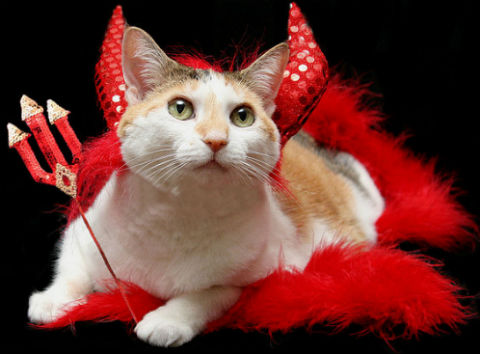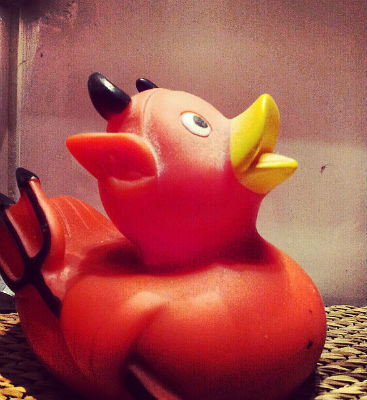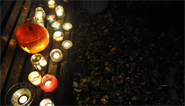 Kitty hasn't got a cat in hell's chance of scaring anyone in that sparkly costume
Halloween upsets some people because they associate it with devil worship. Some of them think that anything they don’t like is “the work of the devil”. Once people divide everything between “with us” and “against us” there’s no room for discussion. What interests me here is not “did the devil invent Halloween?” but “does Halloween have anything to do with devil worship?”
Kitty hasn't got a cat in hell's chance of scaring anyone in that sparkly costume
Halloween upsets some people because they associate it with devil worship. Some of them think that anything they don’t like is “the work of the devil”. Once people divide everything between “with us” and “against us” there’s no room for discussion. What interests me here is not “did the devil invent Halloween?” but “does Halloween have anything to do with devil worship?”
Actually, I have a bigger, broader question in mind. Why is Halloween associated with nasty stuff like ghosts, ghouls, zombies, vampires, witches and warlocks? At least, that’s the impression I get from the “seasonal” scary costumes and pumpkins to carve grimaces into. And there are horror films on TV and at the cinema. Even if this is all playful and we don’t really believe in zombies and vampires any more, somehow Halloween is about spooky things just as Easter is about chocolate eggs and bunnies. Why?
Most of us have forgotten the kind of thing that Halloween used to be about. When it was the evening before the Christian festival of All Hallows or Hallowmas (just as Christmas Eve is the evening before the Christian festival of Christmas) it was a time to prepare to honour some dead people. Not zombies. Not Egyptian “mummies”. Certainly not “undead” vampires. Rather, Halloween and All Hallows was a time to engage with “saints”: people who led exemplary lives or died exemplary deaths and who were expected to help the living in some way. We can still talk about saintly people. But we don’t really have much to do with dead people on a day-to-day basis. Halloween only really makes sense (in its old way) if you think it’s worth having a conversation (even if only once a year) with those who have died. If, however, you think that when people die they are gone, past or finished, then it might be a bit frightening if they pop by for a chat. You can almost hear the sinister music.
I am hoping that you will disagree with the suggestion that the dead are gone and forgotten, or that we don’t talk with the dead any more. In truth, most of us don’t forget our deceased relatives – or the animals who used to live with us. We keep reminders of our loved-ones close to hand. We take flowers or toys to cemeteries and tell the dead all our news. But somehow, while talking to the dead is considered to be comforting, listening to them is weird and spooky. So perhaps it’s no surprise that at Halloween “the dead” (who used to be the focus of the festival) are joined by other, more obviously sinister beings. Or so we’re told. What’s that about?
Halloween traditions are not all about honouring the saints and other departed souls. They also include “trick or treat”. This probably wasn’t invented in America but in Britain and elsewhere in Europe. Originally people requested payment or food in exchange for praying for the dead. But there are more rowdy traditions in which those who did not get the treats they asked for played tricks such as trashing people’s gardens.
 Here come the trick-or-treaters , duck and cover!
It isn’t only these old customs that seem antisocial. Traditional folklore is rife with tricksy and even hostile beings. Fantasy fiction like Tolkien’s books has made elves seem noble and enigmatic. Terry Pratchett draws on an older tradition in which elves might be enchanting and terrific but that was because they “weave enchantment” and “beget terror”. When he says “no one ever said they’re nice” he exaggerates a bit as some elves were thought to be helpful. But Anglo-Saxon and medieval texts provide remedies for humans and cattle who have been “elf-shot”. That is, elves caused illnesses. Even after the conversion of northern Europe to Christianity, people offered sacrifices to elves to keep them away. Perhaps this was important at the start of winter, at Halloween or at what Irish traditions call Samhain which celebrates the start of winter with fires and feasts.
Here come the trick-or-treaters , duck and cover!
It isn’t only these old customs that seem antisocial. Traditional folklore is rife with tricksy and even hostile beings. Fantasy fiction like Tolkien’s books has made elves seem noble and enigmatic. Terry Pratchett draws on an older tradition in which elves might be enchanting and terrific but that was because they “weave enchantment” and “beget terror”. When he says “no one ever said they’re nice” he exaggerates a bit as some elves were thought to be helpful. But Anglo-Saxon and medieval texts provide remedies for humans and cattle who have been “elf-shot”. That is, elves caused illnesses. Even after the conversion of northern Europe to Christianity, people offered sacrifices to elves to keep them away. Perhaps this was important at the start of winter, at Halloween or at what Irish traditions call Samhain which celebrates the start of winter with fires and feasts.
For many Pagans, Samhain (like the Christian festival of Halloween) is a time to honour the dead. Nonetheless, they also remember those old traditions which say that we humans are not alone, we have not tamed the world and we should be respectful and careful in our relations with all life. Perhaps this recognition of living in an edgy world lurks behind the dressing up in costumes (even ones with devilish horns and a tail) and pretending to be spooky. So, Halloween has nothing to do with devil worship and everything to do with having fun while honouring our deceased loved-ones and remembering that the world is a somewhat tricky place to live in.



Rate and Review
Rate this article
Review this article
Log into OpenLearn to leave reviews and join in the conversation.
Article reviews
Very important to respect all Saints day on the 1st of November and to pray with gratitude to the Ancestors on the 2nd of November.